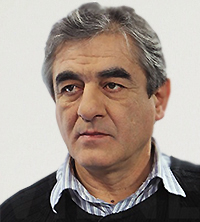
Losing their historic role, the function of establishing the legitimacy of the power, the religious institutions are facing a serious challenge in the modern world, they can not find their place in public life.
The Church had a strong political function to sanctify the right of the government to rule. Besides that, the church represented its value system, its worldview and the place of man in this world, as well as represented its Truth, which was to be the only one, and the path to other truths was blocked. In fact, official churches had monopoly on Truth and other viewpoints were punished. When legal states were formed, churches were actually deprived of the Truth monopoly and their powerful political function. It developed into the principle of separation between the state and the church. Churches are very hard to reconcile to their new status. True, there is an ecumenical movement now and during the assemblies, the right of religious organizations to have their own viewpoint and the worldview is recognized, but each of them is trying to preserve its traditional monopoly in its historic area. Regardless of it all, the influence of religions on societies remains too high. Civilizations are built on religious worldview, and it is not important whether these societies are secular or religious. For example, in Europe, many are atheists and refuse to attend church and religious rituals, but that does not mean that they reject the values which are based in Christianity.
In today’s Armenia, the issue is quite acute. The Church can not find its role in public life. Everything was clear at the time of the former authorities, the church was trying to get monopoly position through legislative changes, and the authorities tried to supplement their lack of legitimacy with the help of the church. Today, this cooperation has been disrupted.
It is important to first assess the situation. We were just talking about the fact that churches have lost their traditional influence. What should this lead to? The consequence is degradation. This degradation is typical of many churches that can not adapt to the new reality. It is also typical of the Armenian Church. The consequence of this situation is that religious institutions are shut down and turned into clans just as the ruling elite turns into a clan when it tries to separate itself from society. In these cases, the two institutions transformed into clans and united against society. Why? Because their value system has collapsed. Even in the people this value system can be better preserved than among the servants of the church.
Many assume that the crisis of the Armenian Church is conditioned by the church’s leadership or by a particular Catholicos. Is it possible to change the situation by changing personalities? Is that a solution?
Let’s look at the personnel issue. It is very similar to the crisis of power. Look, when political leaders are demoralized, people demand that the government change and demand the removal of criminals and oligarchs to change the situation. It’s the same thing there, so people are connecting the issues with personalities. But if we assume that the Catholicos leaves, the question arises: what new theses the new leadership will bring with it?
Look, the new government of Armenia has brought new theses, for example, in Armenia there is no longer a feudal order, there won’t be any more bandits, and there is a rule of law, and so on. But what the new leadership of the church will bring with it? The complexity is exactly here. When such theses appear, for example, when they would proclaim that we do not want the church to be this or that way, and we want something else – then the process will be much deeper. Unlike the Armenian political discourse, there is no such thing in the religious sphere. People do not say that the right values in the church are replaced by false values and that this situation is unacceptable. In other words, there is no system of values in which you have the criterion and you can evaluate the situation.
I have talked a lot with the high ranking clergy of our church and they are dissatisfied with the situation in the church. They often say that the church is in ruins, but when you ask what has happened, why it is being destroyed, there is no answer. If we go deeper, they seek the reason only in personalities, and nothing more. Removal of individuals can activate debates, as it is now in society. Naturally, this situation is maintained by certain individuals. They can not think and live otherwise. But their removal can not be a guarantee of changes. On the other hand, if the requirements are conceptual and convincing, then no one will remain long in his place without having to obey and accept those requirements. In short, this is a very difficult issue that should be publicly debated.